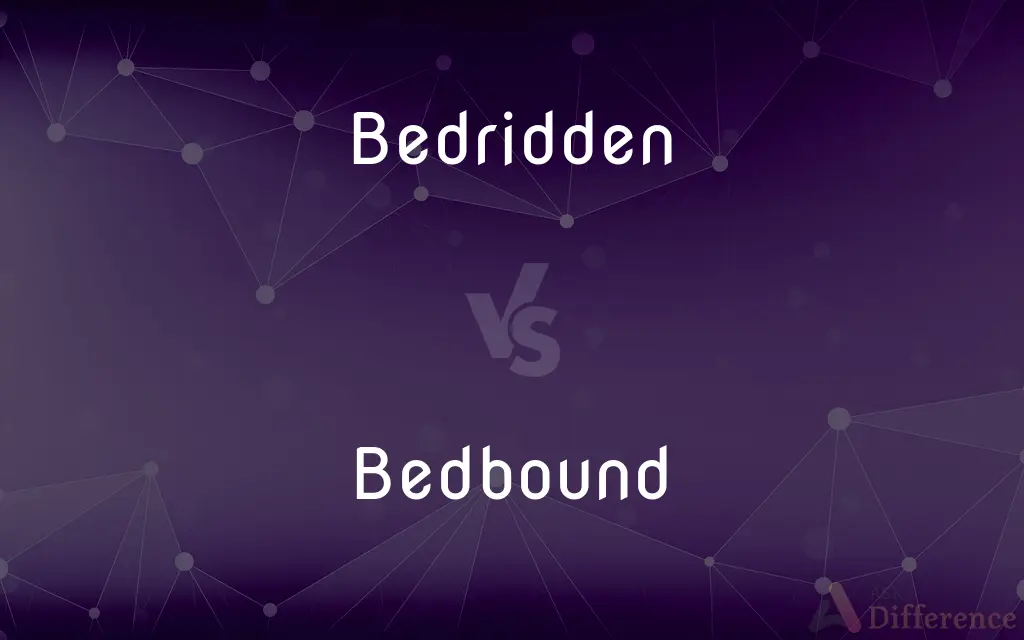Bedridden vs. Bedbound — What's the Difference?
By Tayyaba Rehman — Updated on November 2, 2023
Bedridden implies confinement to bed due to illness, while Bedbound suggests inability to leave bed, often due to severe disability.

Difference Between Bedridden and Bedbound
Table of Contents
ADVERTISEMENT
Key Differences
Bedridden: Linked to illness or recovery. Bedbound: Suggests more severe immobility.
Bedridden: Temporary or long-term. Bedbound: Often long-term or permanent.
Bedridden: Can involve varying degrees of mobility. Bedbound: Implies very limited or no mobility.
Bedridden: May allow for some bed-based activities. Bedbound: Often requires comprehensive care.
Bedridden: Can be due to general weakness or recovery. Bedbound: Often due to profound physical limitations.
ADVERTISEMENT
Comparison Chart
Definition
Confined to bed by illness or recovery.
Unable to leave bed due to severe disability.
Duration
Can be temporary or chronic.
Often long-term or permanent.
Mobility
Varying degrees of mobility possible.
Extremely limited or no mobility.
Cause
Illness, surgery, or general weakness.
Severe disability or paralysis.
Care Needs
May vary from minimal to extensive.
Often requires comprehensive care.
Compare with Definitions
Bedridden
Confined to bed due to illness.
After the surgery, he was bedridden for weeks.
Bedbound
Confined to bed due to profound immobility.
Advanced age left him bedbound.
Bedridden
Immobile due to illness or injury.
The injury rendered her temporarily bedridden.
Bedbound
Inability to leave bed independently.
Since the accident, he’s been bedbound.
Bedridden
Restricted to bed by physical condition.
His condition left him bedridden.
Bedbound
Requires constant care while in bed.
As a bedbound patient, she needs round-the-clock care.
Bedridden
Bed confinement for health reasons.
The flu epidemic left many bedridden.
Bedbound
Restricted to bed due to severe disability.
Her condition has made her permanently bedbound.
Bedridden
Inability to leave bed during recovery.
She was bedridden but in good spirits.
Bedbound
Limited to bed by extreme physical limitations.
A severe stroke has made her bedbound.
Bedridden
Being bedridden is a form of immobility that can present as the inability to move or even sit upright. It differs from bed-rest, a form of non-invasive treatment that is usually part of recovery or the limitation of activities.
Bedbound
Unable to leave one's bed for some reason.
Bedridden
Confined to bed by sickness or old age.
Bedridden
Confined to bed because of illness or infirmity.
Bedridden
Confined to bed because of infirmity or illness.
Bedridden
Confined to bed (by illness)
Common Curiosities
What is bedbound?
Inability to leave bed, often due to severe disability.
Is being bedridden always long-term?
Not necessarily; it can be temporary.
Can bedridden people move?
Yes, some have limited mobility.
Can recovery lead to leaving the bedridden state?
Yes, if health improves.
Is bedbound status reversible?
Rarely, as it's often due to severe conditions.
Are all bedbound individuals permanently immobile?
Often, but it depends on the underlying condition.
What does bedridden mean?
Confined to bed due to illness or recovery.
What medical conditions can make someone bedbound?
Severe disabilities, paralysis, or advanced diseases.
Are bedridden people hospitalized?
Some are, but many receive care at home.
What aids mobility for bedbound individuals?
Specialized medical equipment can assist.
Do bedbound people require constant care?
Yes, usually due to their limited mobility.
Do bedridden individuals need special equipment?
Sometimes, for comfort and medical needs.
Can mental health issues cause bedridden state?
Yes, severe depression or other issues can contribute.
Can physical therapy help bedridden people?
Yes, it can improve mobility and recovery.
Does being bedbound affect mental health?
It can lead to feelings of isolation and depression.
Share Your Discovery

Previous Comparison
Thunderstorm vs. Thunder
Next Comparison
Chirp vs. ChirrupAuthor Spotlight
Written by
Tayyaba RehmanTayyaba Rehman is a distinguished writer, currently serving as a primary contributor to askdifference.com. As a researcher in semantics and etymology, Tayyaba's passion for the complexity of languages and their distinctions has found a perfect home on the platform. Tayyaba delves into the intricacies of language, distinguishing between commonly confused words and phrases, thereby providing clarity for readers worldwide.
















































